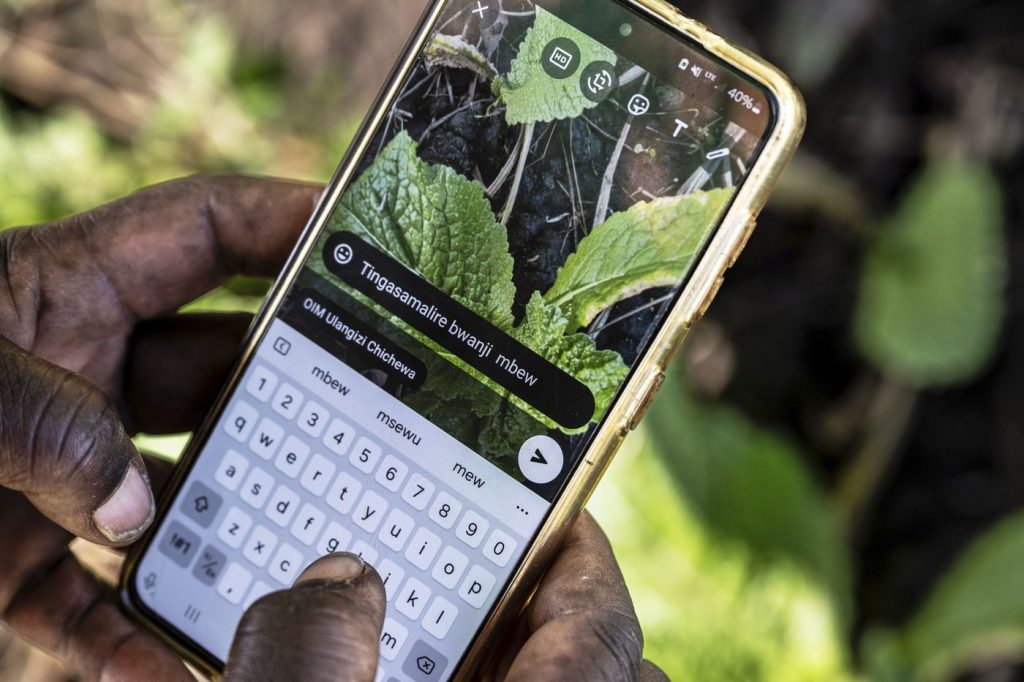MULANJE, Malawi (AP) – In 2023, Alex Maere, a 59-year-old farmer, faced the devastating impact of Cyclone Freddy, which swept through southern Malawi. The cyclone’s floods stripped away the vital soil from his small-scale farm located in the foothills of Mount Mulanje, resulting in the loss of decades of hard work and leading to a dramatic decrease in his corn yield. Previously, Maere managed to harvest around 850 kilograms (1,870 pounds) of corn each season to support his three daughters and two sons, but this year, he salvaged a mere 8 kilograms (17 pounds) from the cyclone's wreckage. He described the transformation of his farm in the village of Sazola into a wasteland of sand and rocks, stating, “This is not a joke."
Freddy's destruction prompted Maere to reconsider his farming strategies. He decided to adopt new methods to ensure his survival, which led him to utilize a generative AI chatbot designed by the non-profit Opportunity International for farming advice. This innovative initiative is supported by the Malawian government, especially as the agriculture-dependent nation faces challenges from a series of cyclones and an El Niño-induced drought. With over 80% of Malawi's 21 million people relying on agriculture for their livelihoods and the country having one of the highest poverty rates globally, these changes in agricultural practices are vital as they precede national elections.
The AI chatbot recommended that Maere diversify his crops; it suggested growing potatoes along with his traditional corn and cassava to adapt to the new soil conditions. Following the AI's advice meticulously, Maere cultivated half a soccer field’s worth of potatoes, resulting in sales exceeding $800. This income allowed him to pay for his children’s school fees without financial stress, a significant turnaround for his family.
The utilization of artificial intelligence in agriculture holds significant promise for sub-Saharan Africa, where an estimated 33-50 million smallholder farms produce 70-80% of the food supply, according to the U.N.’s International Fund for Agricultural Development. However, productivity within Africa remains stagnant even as the global population continues to grow, despite the continent possessing vast expanses of arable land. As the use of AI technology expands, it helps farmers access vital information for disease identification, drought forecasting, fertilizer formulation, and locating affordable tractors. Investment in agriculture-related technology in sub-Saharan Africa surged from $10 million in 2014 to $600 million in 2022, illustrating the growing interest in innovative farming solutions.
Yet, challenges persist. Africa boasts hundreds of languages that AI tools must be trained to understand, and many farmers lack access to smartphones and education. Additionally, unreliable electricity and internet services in rural areas further hinder progress. Daniel Mvalo, a Malawian technology specialist, emphasized the obstacles of accessibility, pointing out that many AI tools do not adequately consider language diversity, literacy levels, and digital infrastructure deficits.
One solution to this accessibility issue is the Ulangizi app, which means "advisor" in the Chichewa language. This WhatsApp-based app operates in both Chichewa and English, allowing users to pose questions either by typing or speaking. For farmers who cannot read or write, the app offers a feature to take pictures of their crops and inquire about any diseases. Richard Chongo, Opportunity International's country director for Malawi, highlighted this user-friendly feature as part of the app's approach to inclusivity.
To improve outreach, farmer support agents, like 33-year-old Patrick Napanja, work in communities by bringing smartphones equipped with the Ulangizi app for those lacking their own devices. Napanja typically supports around 150-200 farmers and tries to meet with them weekly in village groups. However, technical issues like slow connectivity can impede these efforts, causing delays during their meetings.
Trust is paramount, especially given that inaccurate AI advice could result in significant crop failure, risking the livelihood of farmers who are already struggling. Mvalo cautioned that a single instance of erroneous information could deter farmers from using AI tools in the future. The Malawian government actively supports Ulangizi, aligning its programming with the official agriculture department's advice. Nonetheless, there’s still a pressing need to extend the tool's reach to more communities that not only require access to smartphones but also affordable internet services to be truly effective.
Ultimately, the potential for combining AI technology with traditional support systems among local communities in Malawi could lead to improved agricultural productivity. Efforts to facilitate cooperative learning among farmers using the app are already showing signs of success in enhancing yields and fostering a more resilient agricultural sector.











